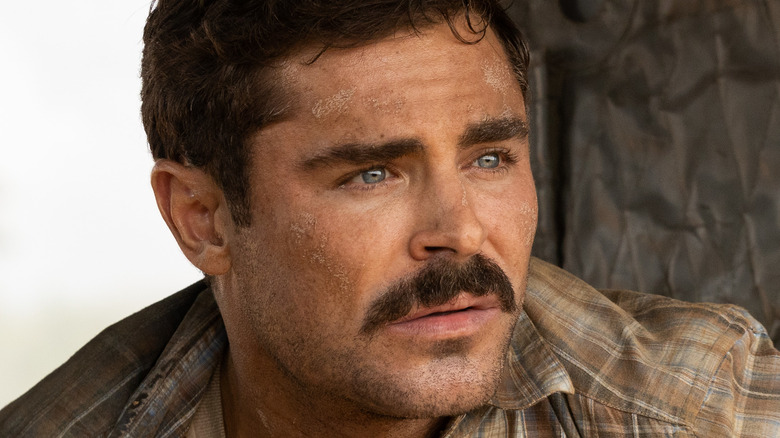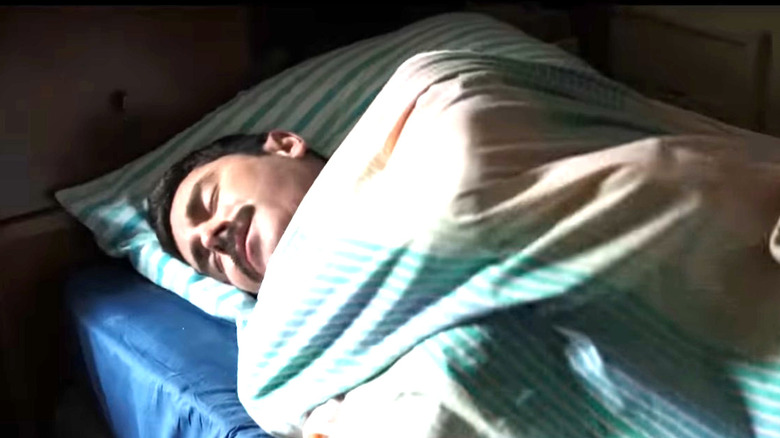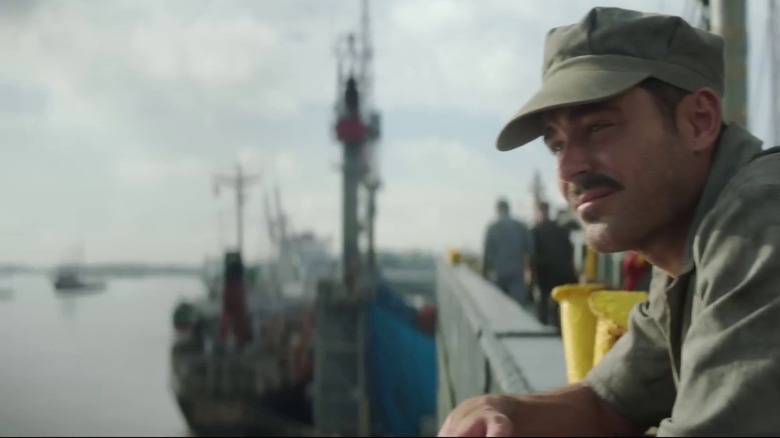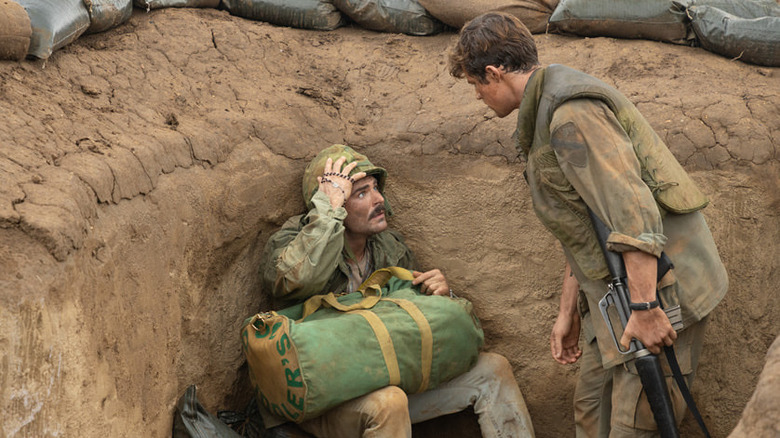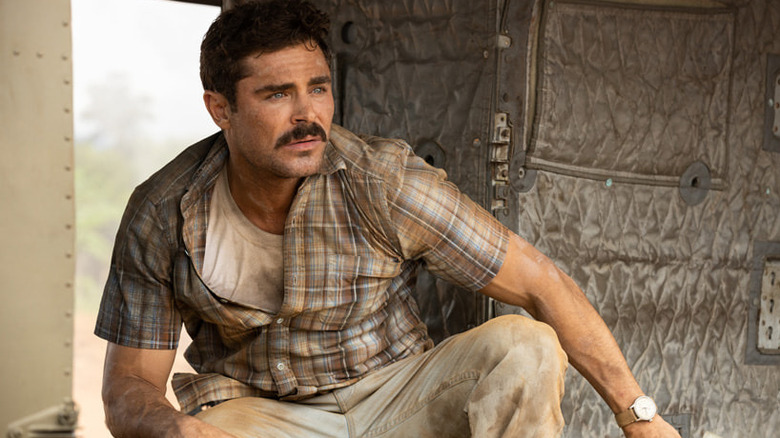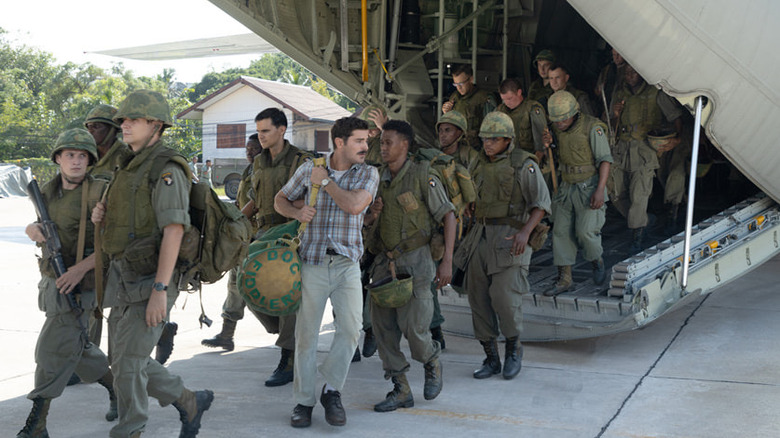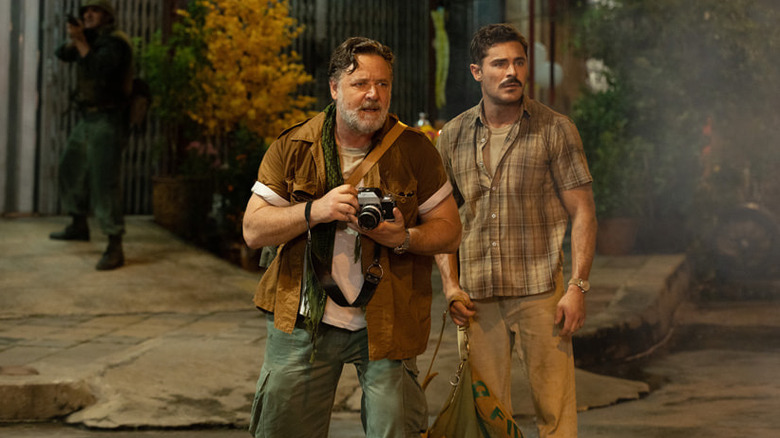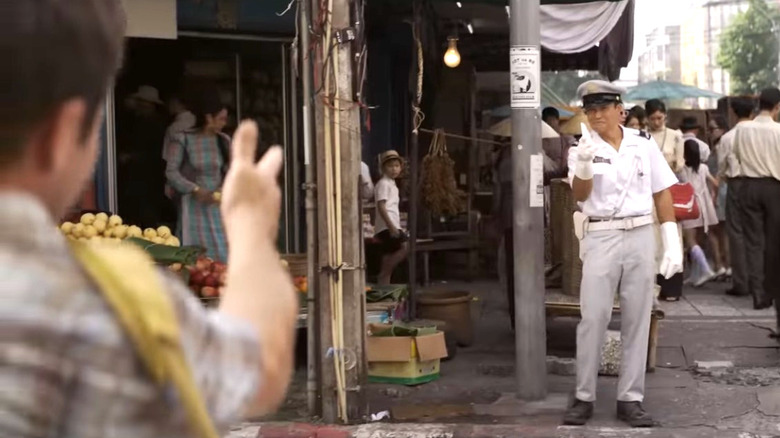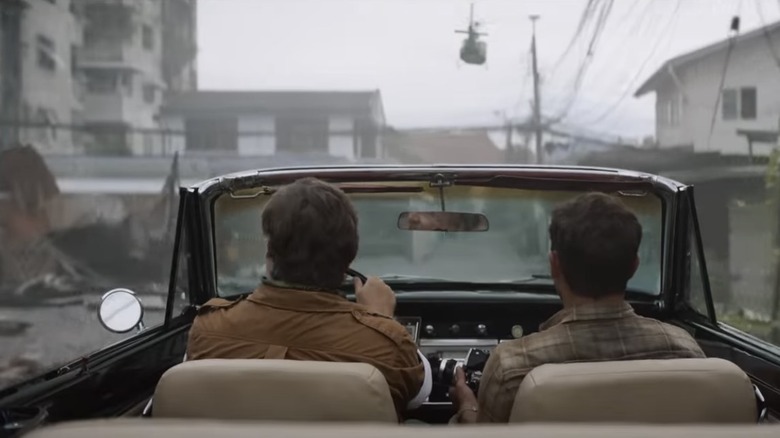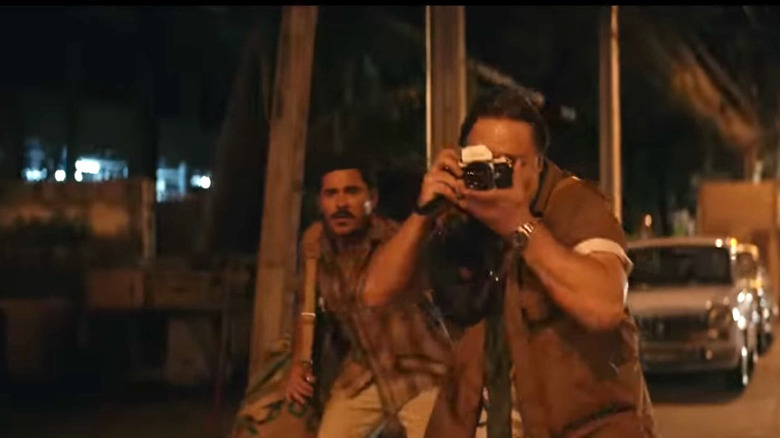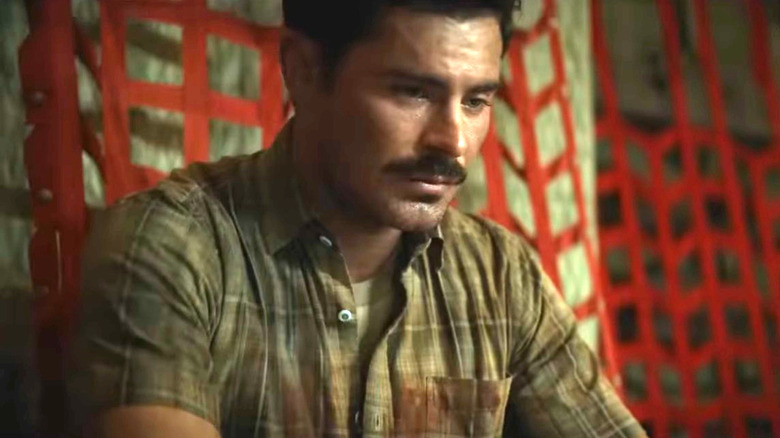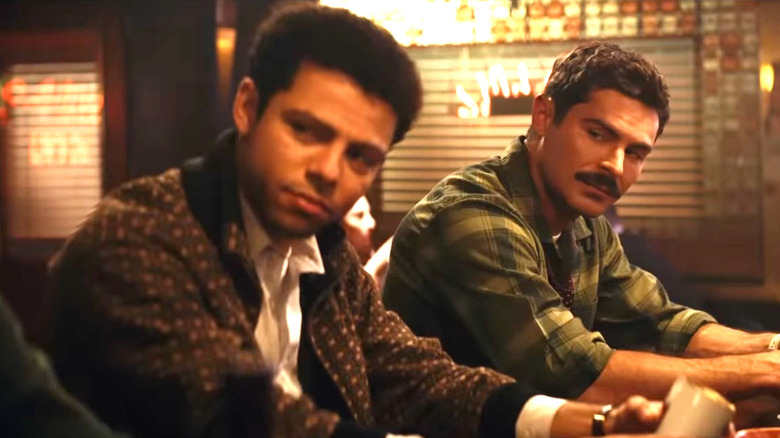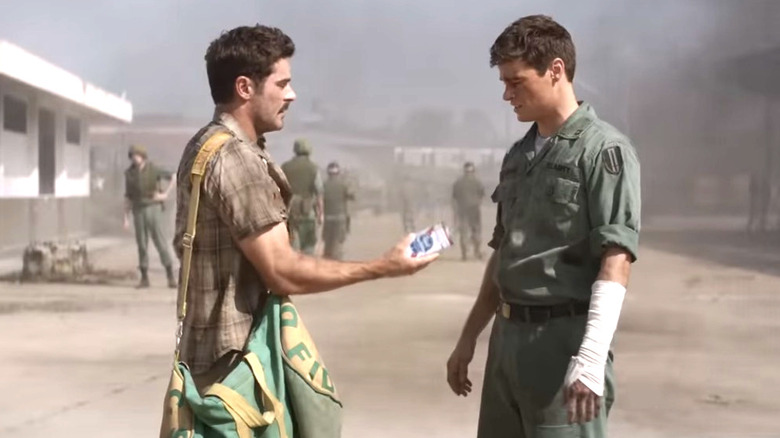The Ending Of The Greatest Beer Run Ever Explained
We may receive a commission on purchases made from links.
"The Greatest Beer Run Ever" is the true story of a New Yorker named John "Chickie" Donahue, who in the late '60s had a moment of inspiration that was simultaneously clever, spontaneous, and extremely stupid: To show support for his buddies serving in Vietnam, he was going to deliver them beer from the neighborhood bar.
Directed by Peter Farrelly, in his follow up to the best picture-winning "Green Book," the film casts Zac Efron as Chickie, a merchant marine veteran living in the neighborhood of Inwood, where memories of World War II and Korea remain still fresh in the minds of many; they see the war in Vietnam as heroic, but as the tide turns and protests begin to fuel the headlines of the day, Chickie becomes determined to remind the troops that they are still supported.
His journey becomes an eye-opening one, as he stumbles upon sketchy CIA efforts, young soldiers in the dark about the motivations of their efforts, and the death of multiple friends. The movie isn't pro or anti-war, instead taking the stance that the world is complicated and confusing, and it's easy to lose your perspective — or build a false one when you're thousands of miles away from the front lines.
In featuring a character so blindly jingoistic, slowly coming to grips with the truth that war "isn't like a John Wayne movie," the film (intentionally) raises more questions than it answers. Below, a (spoiler-heavy) breakdown of some of the big swings it takes in its final frames.
I'll stay awake when I'm dead
The entire movie could be seen as being about Chickie Donahue "waking up." Appropriately enough, then, it begins with Chickie in bed after a lost night of drinking, running late for church. When his father and the rest of the family accuse him of sleeping all the time, Chickie responds with his own twist on an old saying: "I'll stay awake when I'm dead." Maintaining a vague career working on merchant ships for months at a time, he is as rudderless as any vehicle out to sea.
His sister Christine (played by Ruby Ashburne Serkis) is out protesting the war while he's drinking and watching the news coverage, lamenting the fact that their local heroes are being portrayed as baby killers when The Colonel (owner of his favorite bar, played by Bill Murray) suggests that someone should go over there and bring the boys a beer.
Since he has the access, he decides he's going to finally get involved and do what nobody else can: bring their buds some suds. He's secretly nervous, which is only compounded when he starts receiving messages to deliver to the soldiers, but he goes because everyone in the neighborhood is counting on him.
CIA, like James Bond
The reason Chickie isn't immediately arrested and put on a plane back to the States is that once he disembarks, several commanding officers assume he must be a "tourist," code for CIA agents. These "tourists" can't reveal that they're CIA, and they certainly reveal their mission, so with his casual clothes and ever-present duffel bag, Chickie is able to move through these war zones with few questions asked.
Chickie's reaction to being mistakenly identified as a CIA agent is to remark, "CIA? Like James Bond?" This is a funny line (James Bond worked for MI6 in the UK, not the American government), but it also tells the viewer a lot about his character. His understanding of war and espionage comes from movies. He has no idea what he's getting himself into, and plays up the "tourist" angle when meeting other officers, as if he were an actor in a spy movie.
Once he begins to witness the devastation and brutality of the war, he increasingly abandons the CIA charade. He'd been believing the lie that America was saving the Vietnamese from communism for long enough, and now he simply wants to go home. This is why he reveals the truth to an officer before finally leaving the country. The officer, however, seems determined to hold on to the lie.
No man's land
Chickie gets his first real glimpse of the war when he meets up with Rick Duggan (played by Jake Picking). The first soldier he finds, Tom Collins (Archie Renaux), was in a fairly safe area where Chickie could just hang out and drink without fearing for his life. When Collins tries to stop him from continuing his foolish mission, Chickie can't see what he's talking, about because everything seems to be tame and controlled.
Duggan, on the other hand, has to run through the no man's land separating the American and Vietnam side of the battlefield without getting shot just to report back to base and see Chickie. They run back across the battleground together, before diving into a trench and spending the night there. Chickie's conversations in the trench are punctuated by bullet fire and explosions, but he can't see the "enemy." Therefore, there's still something abstract about it all.
So, while his experience there is frightening and he's obviously a bit shaken by the violence, he can chalk it up to war being war. The good guys need to fire bullets at the bad guys, don't they? Well, he's about to get a pretty severe awakening that will carry him through the rest of his adventure.
Love from above
While being lifted out of Duggan's area, Chickie is placed on a helicopter (ironically named "love from above") that is in the process of transporting a Vietnamese prisoner. An actual CIA agent (intimidatingly played by Paul Sloan) boards the chopper as well. Once they're in the air, the agent begins questioning the prisoner. When the poor man says he doesn't know anything, the agent pushes him to the side of the chopper, dangling him over the edge.
Aside from being one of several not-based-in-reality characters in this frequently-somewhat-real story, the CIA agent becomes a symbol of how twisted the "rights" and "wrongs" of the Vietnam conflict became.
The sight of this man, supposedly working on behalf of the US government, doing such a thing horrifies Chickie. He begs the prisoner to just tell the guy whatever he wants to know. When the agent gets his answers, he pushes the prisoner off the helicopter anyway — and the camera shows him slowly falling to his death, pulling back the final veil for Chickie.
More immediate than this awakening — and for the sake of the film's plot — Chickie comes to realize he just witnessed a murder, and that might put him in the crosshairs of the CIA agent. Sure enough, when they land, he instructs another officer to convince Chickie to get on a truck in the guise of taking him where he needs to go. Chickie senses this is a ruse and flees into the woods, where the agent chases him, but he's able to hide. Now Chickie's guard is up because he knows that the agent intended to kill him because of what he saw. At last, Chickie finally understands that the rules aren't so black and white out here.
How fast can you swim?
Chickie's boat leaves early, meaning he has no way out of the country. With no options left, he heads to the American Embassy. They're able to book transport for him, but it won't leave until the following day. Chickie sees this as the perfect opportunity to catch his breath and relax after witnessing a man's murder and running for his life. This is an important moment in the film, because it allows Chickie and the film to reflect on what's just happened.
It's also important because it explains why Chickie can't leave when a sudden attack goes down. Had he actually listened to his buddies who repeatedly told him to get out of there, he wouldn't still be around when all hell breaks loose and the fight hits Saigon — a place the war had yet to reach up to that point. He heads back to the hotel, where he reconnects with war correspondents and tells them that this news of a cease-fire is total bunk.
For the very first time, Chickie is speaking up, exposing an element of the truth that had even been hidden from the press. He isn't singing the praises of soldiers (nor is he condemning them), he's simply stating facts: there is no cease-fire. This is the start of the character's turn during the final act of the movie.
What really hurts America
Shortly after arriving in Saigon, Chickie heads to a hotel bar. He notices the names of press people hanging up and asks the bartender where he can find them. The whole reason he came to Vietnam in the first place was that he hated the way the media was portraying American soldiers, so he is eager to confront them directly. It's here that he meets a war correspondent named Coates (an amalgam character invented for the film, played by Russell Crowe) who seems intrigued by Chickie's simplistic interpretation of things.
While the other members of the press simply brush him off, Coates engages with him a bit, signifying that this relationship will continue. Chickie returns to the hotel when the Embassy tells him he won't be able to leave until the following day. He sees more press names behind the bar and meets up with the reporters again.
He has a conversation with Coates where he gets fired up again, accusing him of not being fair by only showing all the bad aspects of the war, he says that they can't understand because they don't have friends fighting and the truth is hurting America. Coates replies that the names behind the bar are members of the press that they've lost and that truth doesn't hurt America, the attempts to twist it into lies do. A mere 24 hours prior, Chickie wouldn't have believed him. After almost being killed, he can't argue.
Hieu will never see Oklahoma
While initially trying to find the hotel in Saigon, Chickie gets directions from a traffic officer named Hieu, played by Kevin K. Tran. The character does not appear in the film's source material ("The Greatest Beer Run Ever: A Memoir of Friendship, Loyalty, and War" by Donohue and J.T. Molloy), and was created for the film.
Hieu loves that Chickie is from America, because he is a big fan of the musical/movie "Oklahoma!". They form a quick bond — and if you watch closely, you might notice that as they part, Chickie thanks "Oklahoma" by giving him a quick finger-gun salute. This could be seen as foreshadowing that Hieu will be shot and killed.
The next time they meet, Oklahoma gives Chickie directions to the American Embassy. He asks where Chickie lives, so he can visit him in America when he flies over to see the real Oklahoma. Chickie is touched and excited, and offers to buy him a drink when he arrives in Manhattan.
Chickie meets a little girl and her mother who are terrified of him. As long as Hieu is alive, however, he can continue clinging to a belief that the mother and daughter are the exception and Hieu is the rule — the Vietnamese don't hate Americans, they're glad we're here.
But once Saigon gets attacked, he sees Hieu lying dead in the street. He tries to pull him to safety, but it's no use. The remainder of Chickie's optimism dies with Hieu.
Follow the mushroom cloud
The same night Chickie has drinks with Coates, the battle breaks out in Saigon. Chickie sees an American tank blowing a hole in the wall to make it look like Vietnamese soldiers broke in and killed everyone, while he continues to run and hide for his life. The following morning, a nearby explosion at an ammunition dump signals to Chickie that his friend Bobby Pappas (Kyle Allen) could be hurt, so Coates agrees to drive him there. The streets are flooded with corpses. Men and women agonize over the loss of their family members, including several children. It is unflinchingly horrific, and Chickie takes it all in with an expression of remorse.
When he meets up with Bobby, he's relieved that his friend survived, but he no longer takes pride in what he's doing. Bobby tells him he has a good heart, but his head worries him. Chickie's a little worried too because he still doesn't understand what's happening. That's why, when he arrives home, he stands up to The Colonel and his opinion that war is "controlled chaos." As far as he's concerned, there was nothing controlled about this.
War is one giant crime scene
Collins tried to warn Chickie. He flat-out told him that Vietnam isn't like a John Wayne movie. He said that it's hard to tell who the bad guys are. It took seeing a man thrown to his death, being attacked by a CIA agent, finding a dead civilian he thought of as a friend, and driving through piles of shredded bodies to finally understand.
When he finds out that there's a plane willing to take him back home, Chickie runs to find Coates, but Coates has no interest in leaving. He's a war correspondent. This is what he does. Chickie tells him that this isn't a war anymore, it's mass murder. Coates very bluntly tells him that's what war is: one big crime scene.
Thousands of miles away, drunk and sleeping in at his family's house, such realities were easy to overlook. But now, he's seen it all up close.
They found Tommy
There's a subplot running throughout the film that doesn't get a ton of screen time, but it is crucial in understanding why Chickie was there in the first place. Yes, he felt ineffectual and useless, he wanted to contribute to a war he believed in, but what he really wanted more than anything was to find out that his buddy Tommy isn't dead.
Viewers discover early on that Tommy Minogue (played by Will Hochman) went missing. This is a problem for Chickie, because he feels responsible for Tommy shipping out to Vietnam. There's a flashback where Tommy asks Chickie if he's doing the right thing, confessing that he's not so sure. Chickie tells him he is, making sure he understands that he is walking in the footsteps of those WWII heroes who saved the world from the Nazis.
Whenever someone mentions Tommy, he makes sure to mention he's only missing, not dead. Then Bobby gives him the news: they found Tommy dead. If there was any delusion left in Chickie, this news shattered it. The information hits him in the gut — and he rides home in a plane full of dead soldiers, haunted by guilt.
A little less drinkin'
Chickie returns to New York's Inwood neighborhood a changed man. When he is spotted by his buddies, they bring him back to the bar to celebrate his victory. Only, he's not interested anymore. The Colonel even offers him free drinks, but he isn't thirsty. He doesn't feel like celebrating because he understands now that supporting his friends doesn't have to mean supporting the war.
Instead of hoping his drinking buddies will do their best and show those Communists a thing or two, all he can do is hope they don't get killed in a meaningless conflict. The guys back at the bar don't quite understand. Chickie's not sleeping anymore; he's been awakened to the realities of an increasingly-complex world. He can't do that anymore, because that's what convinced him to tell Tommy to ship out in the first place. As far as he's concerned, that's what killed Tommy.
Of course, he's wrong and Tommy's mother Mrs. Minogue (played by Kristin Carey) tells him so. She assures him that going to Vietnam was Tommy's choice and she was just happy that someone was willing to head over there to check on him, even if he was dead. The fact that someone cared that much meant everything to her and the rest of the families in the neighborhood.
The beer's not the point
The idea of traveling behind enemy lines to bring beer to soldiers is ridiculous for a couple of reasons. He could have been killed at any time; American beer is already available in Vietnam and the soldiers can drink it whenever they want. As Chickie says, though, the beer's not the point.
The beer is a gesture of support. It shows the soldiers that people still care about them. It's also a symbol of understanding, which becomes clear in the film's final scene. Christine doesn't support the war. She goes to protests, argues with her family, and tries to open Chickie's eyes to the truth. Unfortunately, the only way he can see what she means is to experience it himself.
So, he returns to the park where he and his sister have a chat. He tells her that he saved the last beer for her. They sit on the bench together in silence. This is his final offering: a chance to reach out to someone he didn't understand and let them know that he has finally been awakened to the realities of his surroundings.
